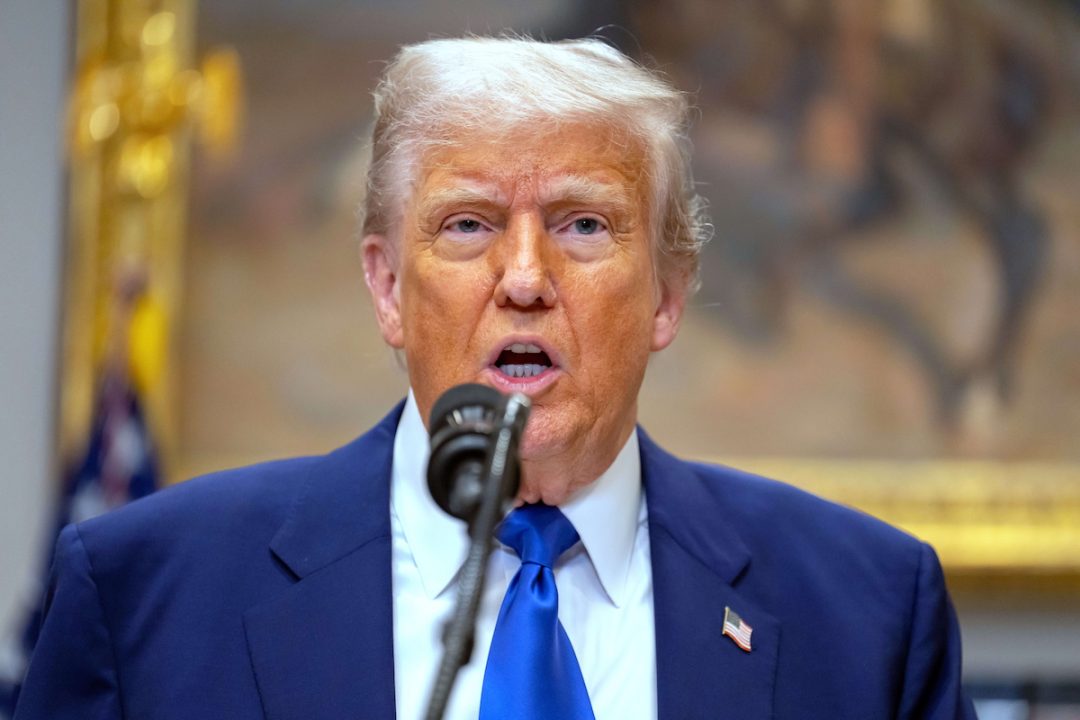
President Donald Trump issued an executive order May 9 directing federal agencies to curb prosecutions of individuals accused of unknowingly violating any of the myriad federal regulations that carry criminal penalties.
The order, titled “Fighting Overcriminalization in Federal Regulations,” explains:
The United States is drastically overregulated. The Code of Federal Regulations contains over 48,000 sections, stretching over 175,000 pages — far more than any citizen can possibly read, let alone fully understand. Worse, many carry potential criminal penalties for violations. The situation has become so dire that no one — likely including those charged with enforcing our criminal laws at the Department of Justice — knows how many separate criminal offenses are contained in the Code of Federal Regulations, with at least one source estimating hundreds of thousands of such crimes. Many of these regulatory crimes are “strict liability” offenses, meaning that citizens need not have a guilty mental state to be convicted of a crime.
In fact, noted Reason’s Jacob Sullum, “At the federal level … regulatory crimes outnumber statutory crimes — another uncertain tally — by a factor of roughly 60 to 1.” This, he contended, “is what you might expect when unaccountable bureaucrats are free to invent crimes.”
As Trump’s order puts it:
This status quo is absurd and unjust. It allows the executive branch to write the law, in addition to executing it. That situation can lend itself to abuse and weaponization by providing Government officials tools to target unwitting individuals. It privileges large corporations, which can afford to hire expensive legal teams to navigate complex regulatory schemes and fence out new market entrants, over average Americans.
Unhappy Trails
Sullum highlighted the case of Michelino Sunseri, a runner who recently broke the record for ascending and descending Wyoming’s Grand Teton. Sunseri is now facing criminal charges for unwittingly using a trail that the National Park Service had closed without clearly communicating the closure to the public.
Similarly, Cato Institute legal fellow Mike Fox pointed out that one can be sentenced to 60 days in jail if he walks his dog on Supreme Court grounds with a leash longer than four feet — even though there is no sign notifying him of this.
To justify their prosecutions of violators such as Sunseri, federal officials would undoubtedly cite the old adage “Ignorance of the law is no excuse.” That would be true if the law were restricted to protecting life, liberty, and property. But when there are so many picayune regulations on the books that no one could possibly discover, much less remember, them all, it is indeed “absurd and unjust.”
Crime Report
The upshot of Trump’s order is that agencies and the Justice Department should no longer seek criminal penalties for regulatory offenses except under limited circumstances. Specifically, “Prosecutions of criminal regulatory offenses should focus on matters where a putative defendant is alleged to have known his conduct was unlawful.” Agencies referring an individual or entity for criminal prosecution must consider how much harm the alleged violation actually caused, how much the putative defendant stood to gain from the alleged offense, and whether the putative defendant was aware of the regulation he allegedly violated.
Furthermore, “Strict liability criminal regulatory offenses are disfavored.” Agencies must have evidence that a putative defendant had criminal intent — the legal term is “mens rea” — before referring him for prosecution, and prosecutors must have the same thing before pressing charges.
Trump also gave each federal agency one year to create a report of “all criminal regulatory offenses enforceable by the agency or the Department of Justice,” including “the range of potential criminal penalties for a violation and the applicable mens rea standard for the criminal regulatory offense.” Each report must be posted on the agency’s website and provided to the director of the White House Office of Management and Budget. The report must be updated annually if not more frequently.
“Criminal enforcement of any criminal regulatory offense not identified in the report … is strongly discouraged,” reads the order. In other words, if someone can’t possibly know he’s violating a rule, he shouldn’t be criminally prosecuted for it. Instead, Trump urged agencies to pursue civil penalties “where enforcement is appropriate.”
Rule and Law
The President further demanded that all future regulations that carry criminal penalties include a statement describing the penalties and which law authorizes them because, as Sullum observed,
A regulation that says “Swiss cheese must have holes throughout the cheese,” for example, says nothing about criminal prosecution, which is authorized by a separate provision of the U.S. Code.
In addition, each such regulation “should explicitly state a mens rea requirement for each element of a criminal regulatory offense, accompanied by citations to the relevant provisions of the authorizing statute,” declared Trump.
Although Trump’s order exempts laws and regulations related to immigration, national security, and defense — the last two a fairly significant carveout — it is still highly welcome. Both Sullum and Fox praised the move. Libertarian National Committee Chairman Steven Nekhaila, in a statement, called it “a commendable step toward restoring individual liberties and curbing governmental overreach.”
All three, however, recognized that there is still much more to be done. Since Trump’s order can be undone by the next president, Congress needs to write its provisions into law. It also needs to get busy repealing unconstitutional laws and regulations. And, said Fox, Trump should “halt these palpably unjust ongoing prosecutions and issue pardons to those already convicted.”




